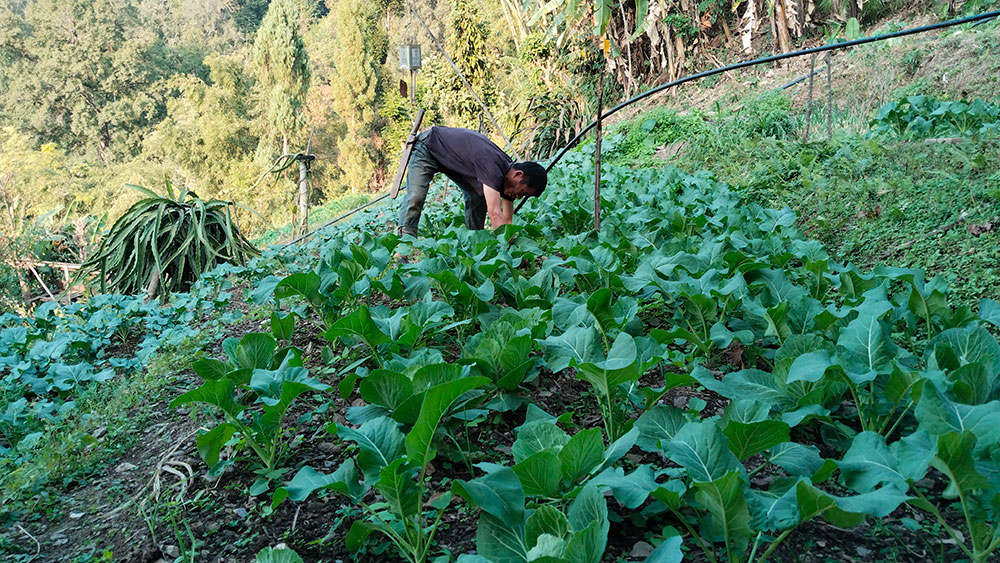Neten Dorji
Samdrupjongkhar—It is 5:45 am in Dewathang—a quaint settlement spread across the southern foothills in Samdrupjongkhar. As dawn breaks, 45-year-old Tshering Gyalpo wakes up, partly thanks to the incessant ringing of the alarm, and partly because of habit.
While his wife heads out of their traditional house to tend to the cattle, he inspects the vermicomposting pits,
He is the sole farmer producing organic manure using earthworms in Samdrupjongkhar.
His journey into vermicomposting began in 2011 when he joined a group of 24 farmers from Samdrupjongkhar dzongkhag on a tour to Navdanya, Uttarakhand, in North India.
There, he discovered the transformative potential of earthworms in agriculture.
“After the tour, I started producing vermicompost on a small scale for my vegetable garden. The results exceeded my expectations,” Tshering Gyalpo said.
Inspired, using kitchen waste, banana peels, and cow dung placed in wooden containers, he began producing compost with just 6,000 earthworms. “Earthworms eat through the layers, and the dark, granular powder formed on top becomes organic manure,” he explained.
Vermicomposting is a straightforward yet transformative process. It involves confining earthworms in bins filled with cow dung, soil, and agricultural residues or pre-decomposed leaf litter. This mixture is broken down into nutrient-rich castings or vermicompost—an organic fertiliser.
Overcoming initial technical challenges, Tshering Gyalpo sought guidance from agricultural experts and the Samdrupjongkhar Initiative, learning how to manage moisture, temperature, and feedstock to improve production.
His efforts have paid off. Today, his farm produces over 500 kilogrammes (kg) of organic fertiliser monthly, significantly boosting yields while eliminating the need for chemical fertilisers.
The switch to organic farming has also brought financial relief. From relying on expensive chemical fertilisers, he now produces enough compost to meet his household needs while generating income.
“Vermicompost has transformed my farm,” he said. “The soil is healthier, yields have doubled. Plus, I do not have to spend a single Ngultrum on fertilisers anymore.”
Starting with one unit, Tshering has expanded to nine, producing up to 80 kg of compost every 45–50 days. A kilogramme of vermicompost fetches Nu 20, earning Nu 100,000 each season. This income supports his family and funds his children’s education.
“I want to be an iconic farmer, and I want to demonstrate that it is possible to produce satisfactory crops using only organic fertilisers,” Tshering Gyalpo said.
His efforts have inspired farmers from neighbouring villages and other dzongkhags, who visit his farm to learn about vermicomposting and organic farming.
He shares his knowledge freely, encouraging others to adopt organic farming practices. With support from the Samdrupjongkhar Initiative, he has also terraced his one-acre land, further enhancing its productivity.
“The land gives us everything. We just need to nurture it with organic practices,” he said.
Initially, he faced criticism from fellow farmers who questioned his methods, even calling it sinful. “I demonstrated to them that it is not sinful. Once they saw the results and the income I earned, they started to believe,” he said.
Looking ahead, Tshering Gyalpo envisions a future where organic farming is a norm across the country. “If I can do it alone, imagine what we could achieve together,” he said, adding that the readily available raw material—cow dung—makes vermicomposting accessible to all.
He credits his success to the guidance from Dzongsar Jamyang Khentse Rinpoche, whose advice encouraged him to pursue sustainable organic farming.


